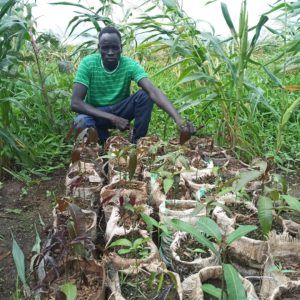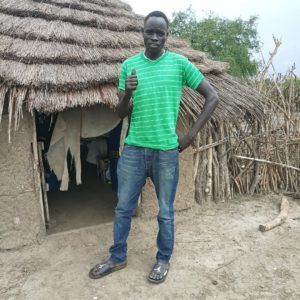 Stories
Stories
August 21, 2020 • 4 min read
Life for Panom Gatluak and his family has been transformed thanks to a GOAL programme helping small-scale farmers in South Sudan’s Upper Nile State to increase and diversify vegetable production.
Panom, a father of six, is the leader of a group of 25 farmers in Wathjack village, Ulang, taking part in a GOAL RECOVER programme funded by FCDO. The programme is aimed at empowering small-scale farmers to feed their households and communities through sustainable vegetable production.

Panom Gatluak leads a group of 25 farmers in the RECOVER programme in Ulang, South Sudan.
“GOAL gave me an opportunity to be included in the distribution of vegetable and staple crop seeds this year,” Panom says. “I learned modern farming techniques and had a better tomato harvest compared to previous years when I was doing it alone. I am also expecting a good maize harvest from the maize seeds GOAL gave me. As I get more money, my aim is to build more houses for my family.”
Panom is now earning the equivalent of around €20 (SSP3,000) a week from the sale of tomatoes to local markets, a 60% increase on what he earned previously. He has used part of his money from tomato sales to invest in his new project of growing mango seedlings for sale, the first of its kind in Ulang. In addition, he and other small-scale farmers are growing vegetables for their own consumption, improving the nutrition of those in their own households.
Rising food insecurity
Ulang, on the north-eastern border with Ethiopia, suffers from chronic food insecurity exacerbated by recurrent conflict and seasonal flooding. Earlier this year, IPC (the Integrated Food Security Phase Classification) projected that 6.5 million people in South Sudan, or 55.4% of the population, face acute food insecurity during this year’s lean season.[1] These figures were calculated before the onset of the COVID-19 crisis, and do not take into account the loss of livelihoods and disruption to humanitarian assistance which has further worsened food insecurity in the region.
As households strive to produce food for their own families, the RECOVER programme is providing the tools and training needed to develop vegetable gardening and to eventually turn it into a business.
The primary challenge for vegetable gardening businesses in Ulang is the limited availability of high-quality and varied vegetable seeds in the market. As a result, production is mostly small-scale, leading to a supply of vegetables which does not meet the community demand.
The RECOVER Programme

The RECOVER programme has helped Panom increase his family income by 60 percent.
The RECOVER programme introduced a vegetable-as-a-business intervention to address this gap. Farmers who normally produce vegetables just for their own households are enabled to upscale to produce vegetables for wider community consumption. Farmers were provided with a wider range of seeds, including for onion, tomatoes, cabbage, kale and watermelon. They were also given tools, water pumps and materials for fencing their vegetable gardens. Targeted training and on-site demonstrations taught farmers more effective techniques for vegetable production, including pest management, harvesting, seed multiplication and marketing.
To ensure the sustainability of the programme, farmers are encouraged to store seeds received from GOAL for future seasons. This enables them to continue implementing methods learned from the programme independently in the future. Production increased for the farmers by 60%, largely due to the provision of water pumps, providing access to a consistent water supply.
The upscaling of these projects represented a large economic opportunity for farmers involved in the programme. With larger quantities of produce, farmers could sell surplus vegetables at their community market, both increasing their household incomes and diversifying the food on offer to other households in their community, thereby improving community nutrition. An estimated 120 to 150 households in the village of Wathjack are benefiting from the larger volume and variety of produce now on offer.
According to the Ulang County Commissioner, Honourable Riek Muon, the RECOVER programme has helped to shape and improve the livelihoods of local farmers, their households, and the community at large as more vegetables are readily available at a relatively cheaper price. He hopes that the programme can continue, enrolling more youths in the future to provide greater job opportunities and to continue generating prosperity and self-sufficiency in the community.
[1] 18. “South Sudan: Acute Food Insecurity and Acute Malnutrition Situation January 2020 and Projections for February – April 2020 and May – July 2020.” Integrated Food Security Phase Classification, February 2020. www.ipcinfo.org/ipc-country-analysis/detailsmap/en/c/1152422/?iso3=SSD
